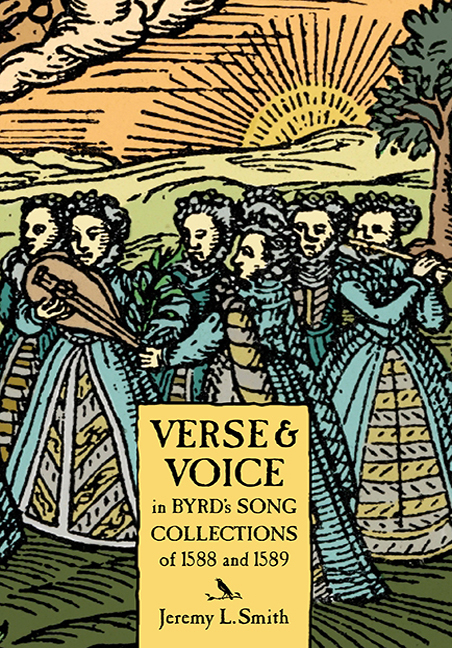Book contents
- Frontmatter
- Contents
- List of Figures
- List of Music Examples
- Preface and Acknowledgements
- Editorial Conventions
- Introduction
- CHAPTER 1 Psalmes
- CHAPTER 2 Sonets & Pastoralls, I
- CHAPTER 3 Sonets & Pastoralls, II
- CHAPTER 4 Sonets & Pastoralls, III
- CHAPTER 5 Songs of sadnes and pietie
- CHAPTER 6 Songs of Three Parts
- CHAPTER 7 Songs of Four Parts
- CHAPTER 8 Songs of Five Parts
- CHAPTER 9 Songs of Six Parts
- Conclusion
- Select Bibliography
- Index
- Studies in Medieval and Renaissance Music
CHAPTER 8 - Songs of Five Parts
Published online by Cambridge University Press: 05 July 2016
- Frontmatter
- Contents
- List of Figures
- List of Music Examples
- Preface and Acknowledgements
- Editorial Conventions
- Introduction
- CHAPTER 1 Psalmes
- CHAPTER 2 Sonets & Pastoralls, I
- CHAPTER 3 Sonets & Pastoralls, II
- CHAPTER 4 Sonets & Pastoralls, III
- CHAPTER 5 Songs of sadnes and pietie
- CHAPTER 6 Songs of Three Parts
- CHAPTER 7 Songs of Four Parts
- CHAPTER 8 Songs of Five Parts
- CHAPTER 9 Songs of Six Parts
- Conclusion
- Select Bibliography
- Index
- Studies in Medieval and Renaissance Music
Summary
AS we begin our discussion of Byrd's songs of five parts, the penultimate segment of his Songs of sundrie natures, it is worth noting that one of the composer's proclivities, as a sequence maker, was to provide effective transitions as he moved from section to section. The songs of three parts, for example, ended with “The greedy hawk” (BE 13: 14) seemingly posing the question: Will Cupid strike? In the first four-voiced song, “Is love a boy?” (BE 13: 15), Byrd confirmed that this was indeed the question, and that it would later be answered affirmatively.
Byrd uses similar tactics at the transition point between the four- and five-part sections. Near the close of the songs of four parts – specifically, in “While that the sun” (BE 13: 23) – he introduces the shepherd Philon, opening the question of what flesh-and-blood character he might represent. The answer, again, is fairly straightforward. In the first song of five parts, “Weeping full sore” (BE 13: 26), Byrd establishes with a reference to one of his own funeral songs (BE 13: 35) that Philon is Sir Philip Sidney. But Byrd does not simply identify the deceased poet-soldier. Instead, as a means of moving the story forward, he begins a section-long process of identifying, via various musico-poetic clues, Lady Penelope Rich nee Devereux, not only as Sidney's muse – the Stella of his Astrophil & Stella sonnet sequence – but also as the one Sidney needed to reject in order to fulfill the requirements of a good death (see Fig. 12). Casting Rich as the representation of worldly sin was not something Byrd did lightly or callously. Indeed, the great challenge he set for himself – which will require special consideration in the discussion below – revolves around the means by which he could achieve such ends without putting any slight on her character.
To shield Rich, Byrd is careful to distance nearly every song from the non-fictional or present day. The five-part section opens in the midst of an Ovidian wood, where the “weeping” Lady Rich is initially evoked.
- Type
- Chapter
- Information
- Verse and Voice in Byrd's Song Collections of 1588 and 1589 , pp. 193 - 233Publisher: Boydell & BrewerPrint publication year: 2016



